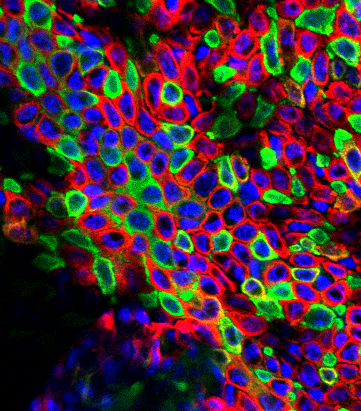Associate Professor Mariaceleste Aragona has been awarded a Leo Foundation Grant
The Leo Foundation has granted Professor Aragona and her team a 4 million DKK grant for their work on identifying factors that improve stem cell self-renewal. The fund is awarded for a period of three years.
“It is a great news for our research to receive this support from the Leo Foundation – it will enable us to identify the signalling cues regulating key behaviours of the skin stem cells. This new knowledge will be used to facilitate skin graft productions for skin replacement procedures.”
Using stem cells for skin grafts
Burns are a global public health problem. It is one of the most common injuries in the world, causing circa 180.000 deaths per year. Luckily, skin stem cells can be used to produce skin grafts for transplantation purposes to treat burns as well as severe genetic diseases. These regenerative therapies are life-saving, and it has been shown that they are successful and safe. However, in order to be able to do long lasting skin regeneration, a good and sufficient amount of stem cells in the graft is needed.
Everybody has skin stem cells, but as we age, the stem cells present in our skin become less efficient. The limited and physiological reduction of the number of stem cells can result in insufficient availability of stem cells for graft production, which makes treatment of large burns or skin replacement therapy in elderly patients challenging.

Tackling the current challenge
Our aim is to identify factors that allow stem cells to do what is called self-renewal. This is a process in which a stem cell gives rise to another stem cell that is identical. It’s the key process that allows an efficient way of producing more stem cells and expanding the skin in vitro. The more stem cells you have in an in vitro culture, the more you can grow the skin.
We are using a mouse model in which we can control the process, so we can translate the knowledge derived from the mouse model to improve current skin graft productions.
Merging expertise to work towards a solution
For this project, competences in stem cell biology are merged with expertise in regenerative medicine. Associate Professor Aragona collaborates with Assistant Professor Elena Enzo, who works at the Centre for Regenerative Medicine ‘Stefano Ferrari’ (CMR), University of Modena and Reggio Emilia, Italy. CMR is a world-leading center for cell and gene therapy with decades of experience in the development of successful long-term epithelia reconstitution.
How findings could contribute to society
The findings of this project will contribute to a better understanding of stem cell biology. It has the potential to improve and accelerate skin regenerative and replacement therapies for the benefit of patients, as well as reveal new insights into various skin diseases.
